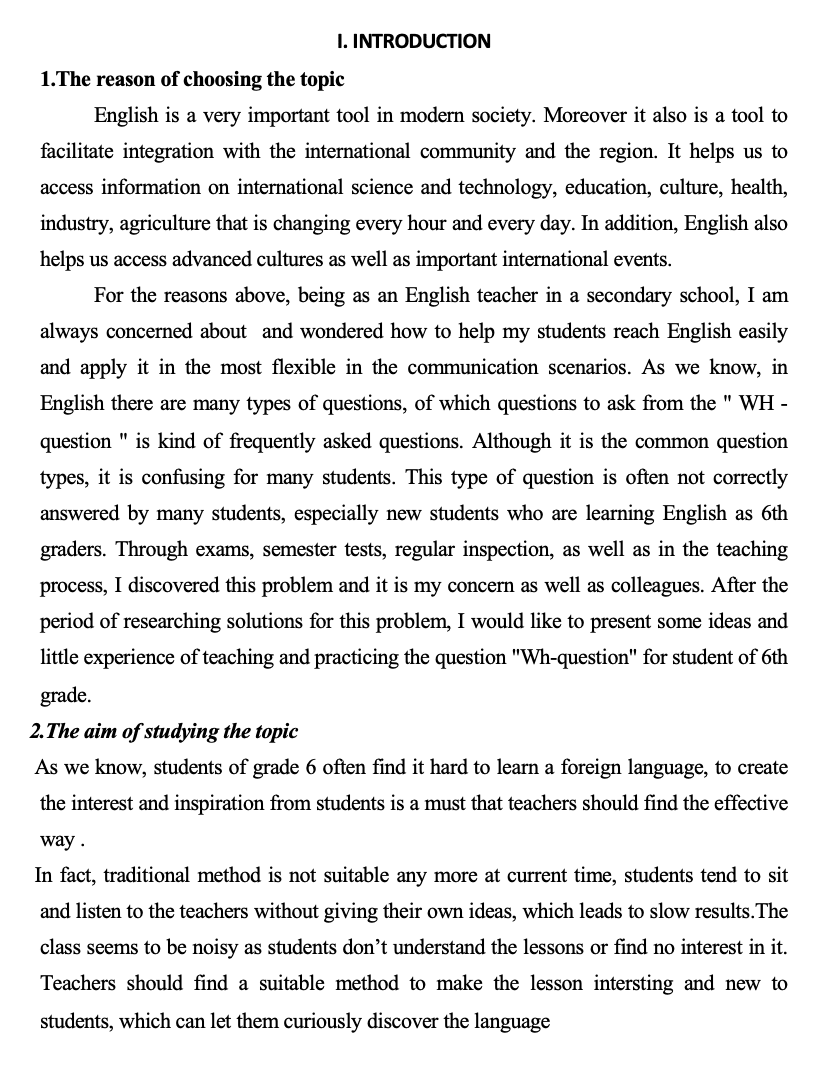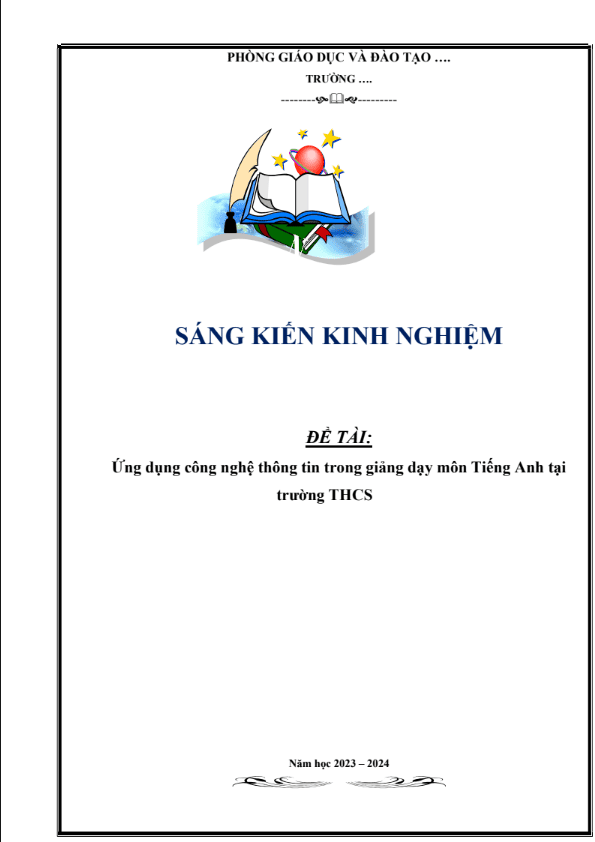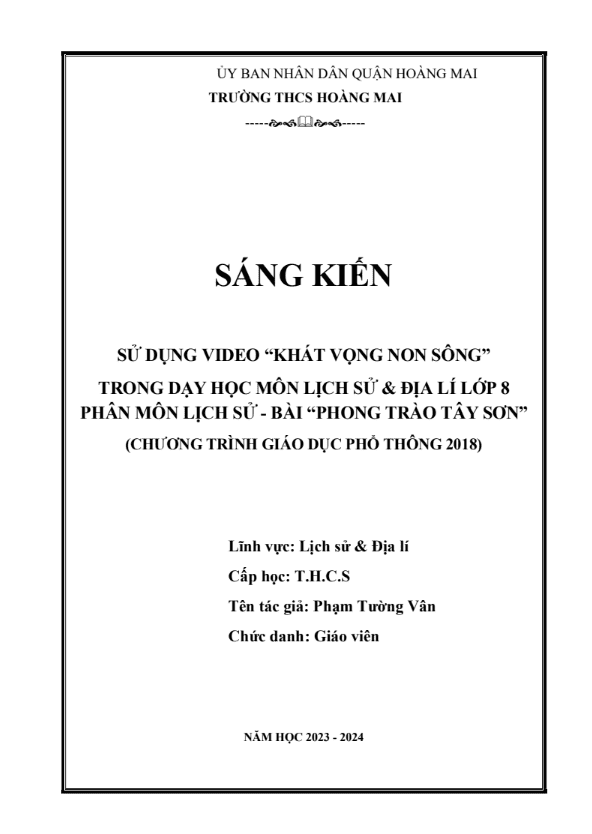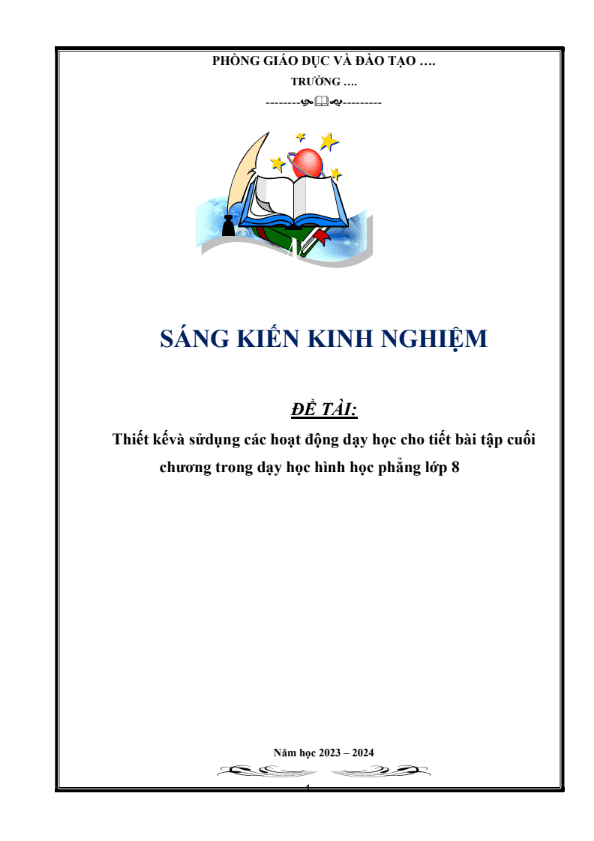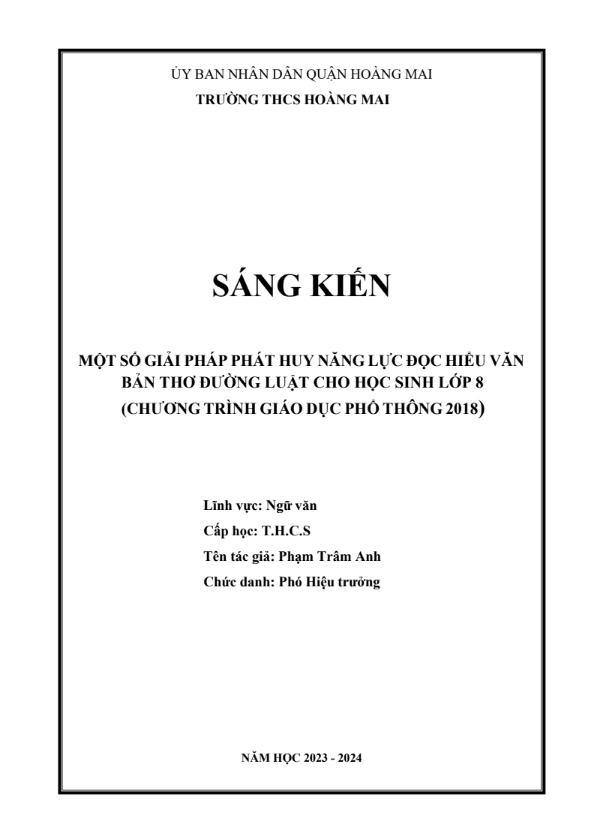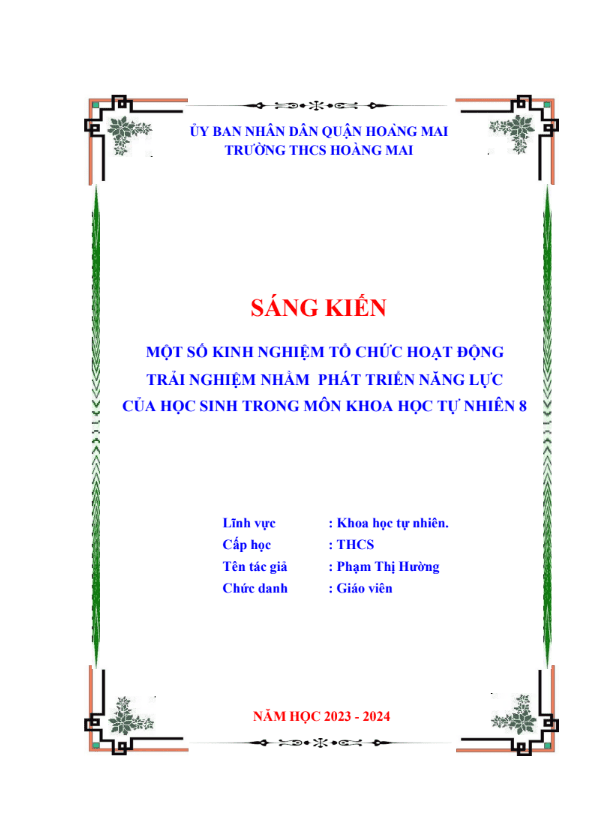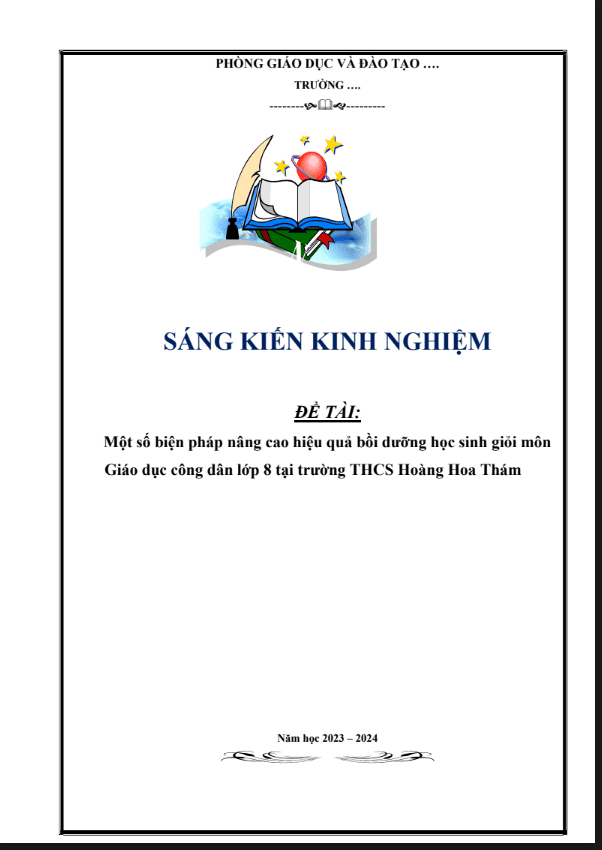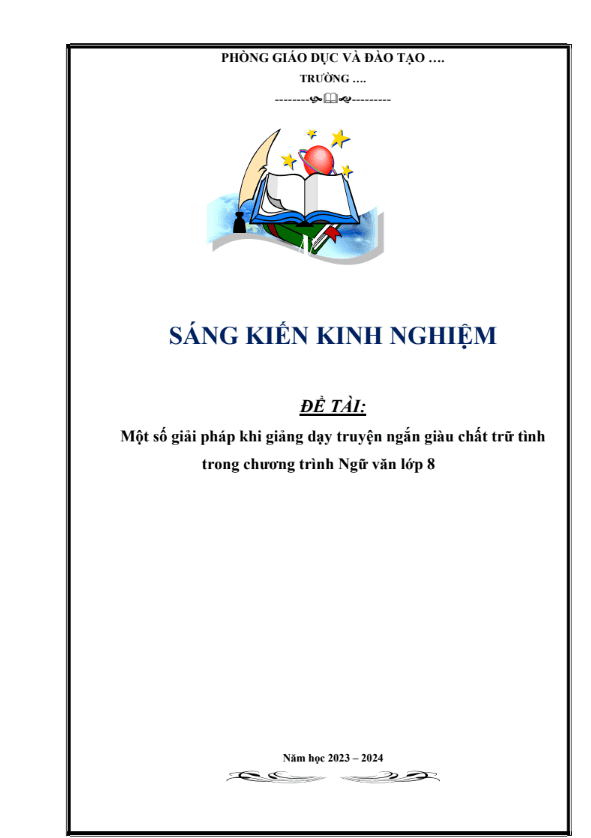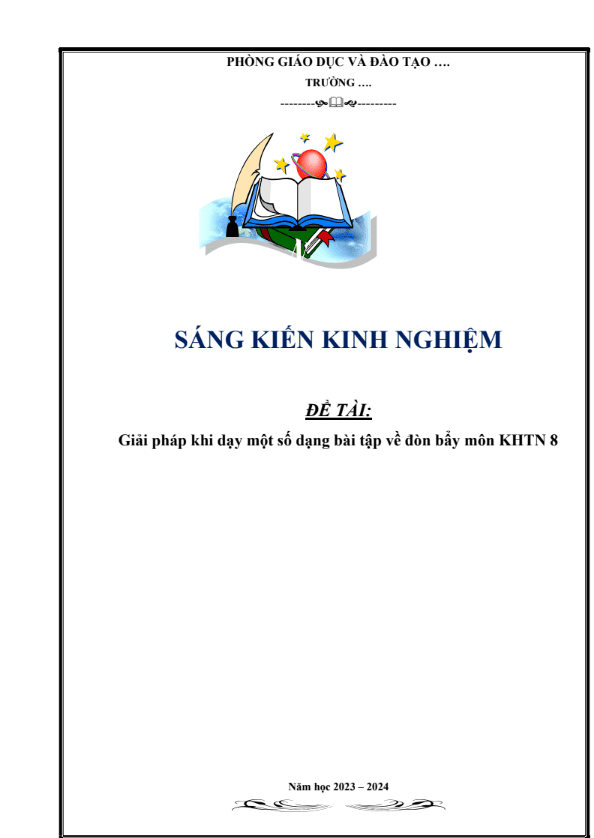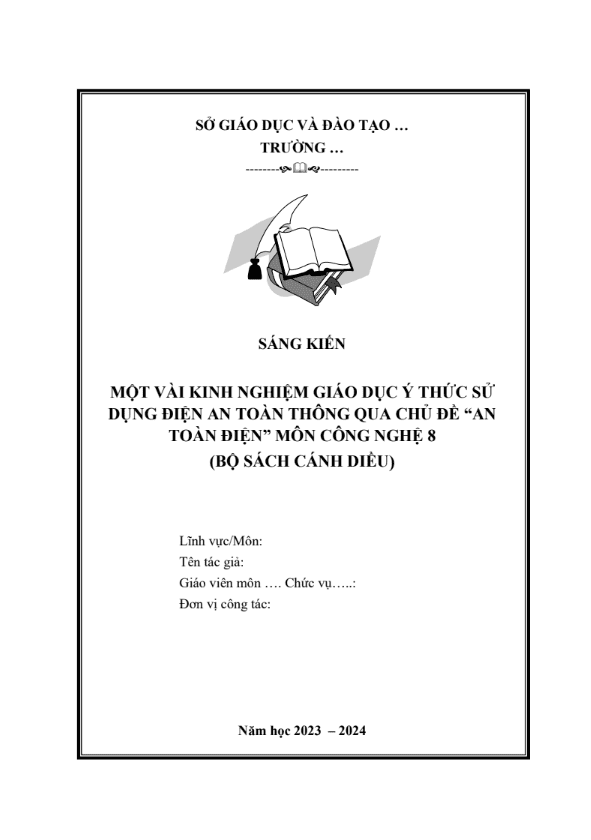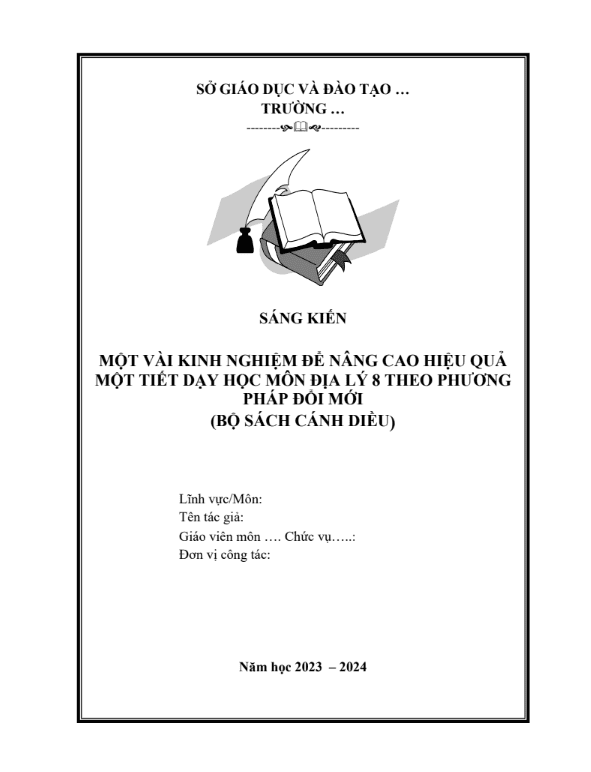SKKN Skills training experience for grade 6 students to ask and answer the question wh – Question
- Mã tài liệu: BM6133 Copy
| Môn: | Tiếng anh |
| Lớp: | 6 |
| Bộ sách: | |
| Lượt xem: | 524 |
| Lượt tải: | 6 |
| Số trang: | 19 |
| Tác giả: | Nguyễn Thị Huyền |
| Trình độ chuyên môn: | Thạc sĩ giáo dục |
| Đơn vị công tác: | Trường THCS Ba Đình |
| Năm viết: | 2020-2021 |
| Số trang: | 19 |
| Tác giả: | Nguyễn Thị Huyền |
| Trình độ chuyên môn: | Thạc sĩ giáo dục |
| Đơn vị công tác: | Trường THCS Ba Đình |
| Năm viết: | 2020-2021 |
Sáng kiến kinh nghiệm “SKKN Skills training experience for grade 6 students to ask and answer the question wh – Question” triển khai gồm các biện pháp nổi bật sau:
1. Identification of “Wh- question”
2. Types of “Who – question” in English book for students of grade 6
2.1 Who + V + Complement/ O…?
2.2 Sentences have modal verbs (ought to …)
2.3 Ordinary verbs:
2.4 Answer for Wh – question
3.The way to form Wh-questions
4. The types of exercises:
5. Teaching rhythm, pronunciation, intonation in the types of Wh-question”
6. Teaching Wh-questions associated with new words.
7 . Teaching Wh-questions associated with passive voive
Mô tả sản phẩm
- INTRODUCTION
1.The reason of choosing the topic
English is a very important tool in modern society. Moreover it also is a tool to facilitate integration with the international community and the region. It helps us to access information on international science and technology, education, culture, health, industry, agriculture that is changing every hour and every day. In addition, English also helps us access advanced cultures as well as important international events.
For the reasons above, being as an English teacher in a secondary school, I am always concerned about and wondered how to help my students reach English easily and apply it in the most flexible in the communication scenarios. As we know, in English there are many types of questions, of which questions to ask from the ” WH – question ” is kind of frequently asked questions. Although it is the common question types, it is confusing for many students. This type of question is often not correctly answered by many students, especially new students who are learning English as 6th graders. Through exams, semester tests, regular inspection, as well as in the teaching process, I discovered this problem and it is my concern as well as colleagues. After the period of researching solutions for this problem, I would like to present some ideas and little experience of teaching and practicing the question “Wh-question” for student of 6th grade.
2.The aim of studying the topic
As we know, students of grade 6 often find it hard to learn a foreign language, to create the interest and inspiration from students is a must that teachers should find the effective way .
In fact, traditional method is not suitable any more at current time, students tend to sit and listen to the teachers without giving their own ideas, which leads to slow results.The class seems to be noisy as students don’t understand the lessons or find no interest in it. Teachers should find a suitable method to make the lesson intersting and new to students, which can let them curiously discover the language
The topic helps students to memorize the way to use Wh- questions properly. Students can practice a lot with various kinds of exercises. Some techniques are used to check how students understand the lesson.
3.The objects of studying
Students in grade 6 at Dong Linh secondary school
(Throughout teaching and working with students of grade 6)
4.The method of studying
These experiences have been studied on the following methods:
- Studying of material
- Giving outlined mirror
- Operating and using method
- Checking, connecting. projected classed
- Studying from experienced colleagues
- CONTENT
1.The theoric installation of the problems
What are the causes of the wrong answers to the questions related to Wh-questions? Apart from reasons of teaching and learning as mentioned above, the analysis of the following grammar will show us “Wh-question” is the kind of question that is not easy to students of grade 6.
Firstly, students do not understand about the auxiliary verbs. In the framework of the 6th grade, they just remember a certain number of questions, if we change a little in question, the students will not know when to use the verb “be”, when to use ordinary verb in the present tense and how to divide verbs in the 3rd person singular pronoun.
Secondly, “Wh-question” is a question with one subject in which the subject is often a personal pronoun (except idioms). Thus the answer requires conversion of the noun being a subject (of a sentence) in question into the personal pronouns in the answer, or the personal pronouns to the different personal pronouns for suitable context (eg: “You” in question but “I” in answer’ or your school can use It to replace, etc.). It is also very difficult for students if they do not get much exercise.
Thirdly, There is a type of the question to find out information, students are required to find the exact information needed to answer, but they sometime are confused, for example putting excess or lack of information, or making a completely false information, such as “a man ask about chicken, a woman answer about duck”, for example, “How old are you? ” – “I am fine, thanks.” Or “What does your father do?”-” He reads
These three issues are crucial and the most difficult for students. Besides determination of the structure or the tense in question is the problems that 6th graders students do not usually think about.
- Practical background
In general, teachers described the structure of each question for students to grasp this question but basically conveying methods are also quite embarrassing, Response of student to these questions seems to be machinelike, less accurate and meet much trouble.
For the students, they had access to English at the primary school, however they only learn English language in a modeled and machinelike way, they do not think much about grammar, spelling. When answering the questions, especially the question “Wh-question”, the answer seems to be inertial, according to the pronunciation way that teachers often train their students. For example, students always answer, “I am a student” to the question “what does she do?”. They are not noticed the differences, the auxiliary verb and the subject in the question. Considering that this is a way of learning like a machine and lack of thinking. Through a survey for students of grade 6, I offer 10 questions.
Answer the following questions:
- How old is your mother?
- Where does she live?
- How do you spell your name?
- What is your father’s name?
- What is his address?
- What is his job?
- What is there near your house?
- Which school does your sister go to?
- How often does she go to school?
- How far is it from your house to your school?
(Each correct answer is given 1 point)
The results were very low in quality; summary of results is presented as bellows:
| Grade/class | Total of students | Point (0-4) | Point (4.5-7) | Point (7-10) |
| 6A | 36 | 25 | 11 | 0 |
| 6B | 35 | 29 | 6 | 0 |
The above figure shows that the level of understanding of the question “Wh-question” of students is very weak. Besides, the majorities of students not only answer wrong, but also only use one type of personal pronouns such as “I am …” or “I live …” in response to the third person singular pronoun. They do not figure out how to use “to be”, verb or “there is / there are” to answer question correctly. The results not only showed quality of students, but also strongly affirm the problem that we must pay attention.
There is a reality to the students we often find, it is that lets students to read a passage and then use “WH-question” to test their understanding. The problem is that students often rewrite all the answers in the text rather than the correct answer. For example, in the passage, it is: ” My school has 4 floors with 20 classrooms, and my class in on the second floor ”,” students often write down the whole sentence while the question is: “How many classrooms are there in your school? “:
TÀI LIỆU LIÊN QUAN
- 0
- 114
- 1
- [product_views]
- 2
- 163
- 2
- [product_views]
- 3
- 183
- 3
- [product_views]
- 0
- 124
- 4
- [product_views]
- 0
- 134
- 5
- [product_views]
- 0
- 109
- 6
- [product_views]
- 5
- 101
- 7
- [product_views]
- 7
- 117
- 8
- [product_views]
- 1
- 174
- 9
- [product_views]
- 8
- 179
- 10
- [product_views]

